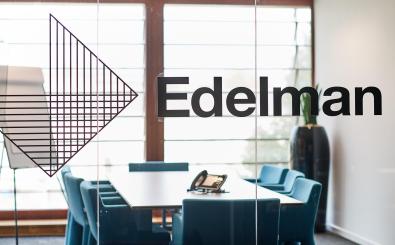Trust. It’s a simple word, with only five letters and one syllable. But it’s big on meaning, with the power to make and break governments. Trust is the essence of brand equity, of professional and personal relationships. That’s why it’s so important to us at Edelman.
Trust Makers. Our new interview series explores the sharpest minds in marketing and communications in the Netherlands. First up is Benjamin Puygrenier, Senior Communications Manager at Tinder, to talk about building trust with Gen-Z, product innovation, and bingo drag parties.
What have you learnt about building trust?
After 11 years working in communications, my biggest takeaway is that trust isn’t built but earned by doing good. For businesses, that means having people with great values and beliefs.
What do you believe are the key behaviors that are important to building trust?
Simply build a team with great competence (delivering on promises) and with great ethical behavior. It’s important for Gen Z to see what brands’ values and positions are on important issues at every point of transaction – how are you addressing this? 50% of Tinder members are Gen Z so their values are our values. We put a lot of emphasis on diversity and inclusion and how through our services we can help build a more inclusive society. Tinder was the first mobile-first dating app to give people a feature that empowers them to identify beyond man or woman in 2016. We are also adding in-app language about how Tinder welcomes everyone and how members will see potential matches who identify outside the binary—directing members to learn more about “More Genders” and the feature’s importance.
We also introduced Traveller Alerts for members who are visiting countries where they may be unsafe due to their gender or sexual identity. This is an automatic notification in the app sharing details, safety information, and an option to disable their Tinder profile temporarily. Be inclusive, diverse and solution-driven; that’s how we address things.
How have audience expectations changed regarding trust within your category?
Dating apps would not exist if they were not fulfilling a strong human need. The audience expectations did not change regarding trust; people who join a dating app are looking to have a fun, easy, and safe experience. Online dating is based on trust and intimacy, the rationale why we don't see big changes. 59% of Gen Z globally* say that they will stop buying if they don’t trust the company behind the brand. How are you looking to form trust with this audience? Ten years after our creation, Tinder is still the number one app worldwide for meeting new people. There are no magic recipes to build trust. If you have a great product offering a great experience and an intuitive and safe platform, then you have the basis. Building trust is about making good choices as a brand. Choices that protect your community, no matter the business impact.
How do you find a balance between societal role, support-driven comms and product/sales focussed comms?
To me, there should not be a balance, and I like to call this the chain of impact; if your company is answering a strong societal need, I would even say fundamental, then you have a story, and if you have a story, you have your sales narrative. And if you take a step back, the best products sell on their own, because there is a story behind them. I think that we sometimes have the capacity to make things complex where they can be simple.
Bumble, eHarmony, Happn, Badoo and more. What is Tinder doing to stay ahead of the competition?
I don't look at competitors because, to me, it's outdated. Each competitor has its own brand affinity, brand service but also a different history or audience, so it’s like comparing apples and bananas in a fruit salad. And that’s the mistake a lot of marketers make. If you want to be in the game, don't look at competition; look at your members, your community and ask them why they would like to get more from your product, and how you can improve it. This way, you stay focused on the road and not on the cars.
Where do you see the big bets in marketing and comms in the next 18 months/ 3 years/ 5 years, etc.?
Three bets: Gaming, AR and AI; while considering that we will need to rethink soon what we do in terms of digital sobriety.
What advice would you give to someone starting their career in marketing and communications now?
Do as many internships as you can, and do not be afraid to shift from one industry to another, do not focus on one industry. You will learn way more by exploring different universes. This is what I loved about my time at an agency; being able to work with a different set of industries and ways of working.
What is the most valuable piece of advice you’ve ever received?
To focus on what you can control and stop thinking about what you can’t— a brilliant piece of advice for anyone who is learning how to be a master of priorities.
How do you manage your work-life balance?
I’m not sure I’ve ever met someone who can for a long-term period. This is not something you learn at school, and we need to be honest; when you work in the communications industry, there will always be something urgent, and there will always be some non-planned work overnight. The question is more if you are happy in your job and if your work is not taking too much of your personal time.
What does your Sunday routine look like?
It depends and changes quite a lot from one weekend to another. From the covid period, I’ve learnt that listening to myself, especially my body, was key. So, Sunday can be just do nothing or can shift into a bingo drag party.



